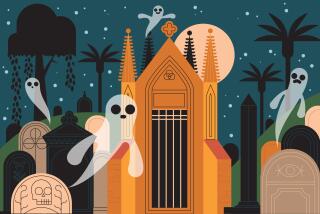UNICEF Treat May Be Better This Halloween : African Famine Spurs Requests for More Cartons in Fund Drive
In many Southern California neighborhoods, Halloween isn’t what it used to be.
Parents, fearing poisoned treats and molestation, are keeping their children home. And neighborhoods once alive with costumed children and lighted pumpkins are dim and quiet.
Unfortunately for UNICEF, the United Nations Children’s Fund, this has meant a tapering off in recent years of money to help sick and hungry children in the world’s developing countries.
Halloween is also national UNICEF day and the focus of the organization’s largest single fund-raising event, “Trick or Treat for UNICEF.” Although the effort raises less money than the organization’s holiday greeting card sales program, it involves more individual support, according to national UNICEF Day officer Jean Fraser. But as safety concerns have mounted, support for the 35-year-old program has declined.
Halloween this Thursday, however, may mark a resurgence for the fund-raising drive in which children with official cartons collect money for UNICEF as well as candy for themselves.
This year, the nonprofit U.S. Committee for UNICEF has given out about a million official collection cartons nationally, 10% more than last year, said Fraser. Candler Miller, Southern California director for the U.S. Committee for UNICEF, said the local office has also received more orders for the boxes and received them earlier than ever before. Miller attributes the turnaround to the catastrophic drought in Africa, which has inspired massive fund-raising efforts by big-name entertainers this year.
One of UNICEF’s primary concerns, Miller said, has been the spread of disease, notably measles, at food distribution centers set up in Africa by relief organizations. Malnourished children are extremely vulnerable to the diseases to which they are exposed at the centers, which are often unsanitary, fly-infested and without clean water, she said.
Earmarked for Immunizations
Proceeds from the trick-or-treat program this year are earmarked for immunizing children in developing countries against the six “killer” diseases--measles, whooping cough, tetanus, polio, diphtheria and tuberculosis, Miller said. “For $5, a child can be immunized for life against those six diseases, which cause 5 million deaths a year and 5 million additional disabilities of young children,” she said.
At its peak in 1970, the national Halloween drive raised $3.3 million.
UNICEF and the World Health Organization have set a goal of global immunization by 1990, Miller said.
Two recent events have given these fund-raisers reason to believe their goal is realistic, she said. This spring, both sides in El Salvador’s civil war declared a cease-fire for three separate days so the children of the country could be immunized through a joint venture involving many government, military and civil organizations and private volunteer groups. As a result, 85% to 90% of the country’s children were immunized, she said.
Also, in 1984, Colombia initiated a massive public awareness campaign that also resulted in 85% to 90% of that country’s children being immunized, Miller said.
“In countries with communications and transportation realities like El Salvador and Colombia, to imagine immunizing that high a percentage of the population is remarkable,” Miller said. “But it is an indication of what can be done if all sectors of society place a priority on it.”
School systems have in the past provided the bulk of UNICEF’s Halloween solicitors in the United States, but orders for collection cartons have come in this year from a variety of churches and community organizations, she said. In addition, cartons have been picked up by members of sororities and fraternities as well as individuals who said they went door to door for UNICEF when they were young and want their children to do the same, said Ann Miller, UNICEF chairman for the Orange County chapter of the United Nations Assn., which operates centers in Santa Ana and Irvine.
“This is the first year we’ve done it,” said Robert Erickson, president of the Sigma Chi fraternity at UC Irvine. He said Sigma Chi and the Kappa Alpha Theta sorority obtained 75 cartons for Thursday evening, when they will go door to door in costume in Irvine soliciting for UNICEF.
Image Problem
“Obviously, fraternities have had a problem with not having a strong name in the community. The community doesn’t believe we’re there to do anything but party and destroy things. . . . We thought this would be a great way not only to raise money for UNICEF but to give us a better name in the community,” Erickson said.
Some cities require UNICEF collectors to obtain solicitation permits. Selected centers distribute copies of a permit obtained by UNICEF for the City of Los Angeles as well as the official orange UNICEF carton and a report form and collection envelope. Collectors should call their cities’ social services department to see if the Los Angeles permit will suffice, Miller said. To find the nearest center that carries cartons and permits, call the U.S. Committee for UNICEF in Los Angeles at (213) 551-1191.
UNICEF encourages children going door to door to walk in groups, have adult supervision and be home by dark. The organization also suggests other means of fund raising for which permits are not needed: hosting a haunted house, a pumpkin-carving or a costume party, for example.
Bound by ‘Honor Spirit’
Collectors are bound only by the “honor spirit” to send the money back in, Miller said. Some don’t turn in the donations, but that’s not a widespread problem, she said. “We like to think of it as people taking out a loan, and someday sooner or later they will repay that loan by sending in a check to UNICEF.”
UNICEF keeps a computerized record of all those who obtain cartons, and if money is not returned by January, reminder notices are sent out, she said.
The organization also aims to raise money this year by adding public-service announcements and a call-in pledge number to its fourth annual radio mystery theater, broadcast before a live audience Halloween night. The show, which features scary stories from Stephen King and others, will be performed by a cast that includes June Lockhart, Leigh Taylor-Young and radio personalities Gary Owens and Casey Kasem. It will be broadcast nationwide on about 300 stations. In the Southland it can be heard on station XTRA, 690 AM.
The public may attend the performance at 7:30 p.m. at the Sheraton Premiere Hotel, 333 Universal Terrace Parkway, Universal City. The performance is free, but reservations are required and may be made by calling (213) 551-1191. Tickets, at $40 each, are also available for a buffet dinner and dance following the performance.
Proceeds from the radio program are targeted specifically for UNICEF’s Africa Emergency Fund for famine relief.
More to Read
Sign up for Essential California
The most important California stories and recommendations in your inbox every morning.
You may occasionally receive promotional content from the Los Angeles Times.










